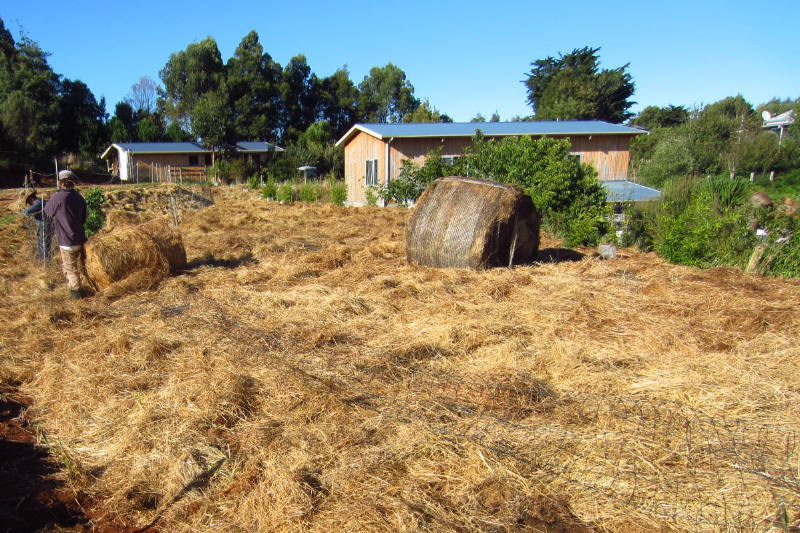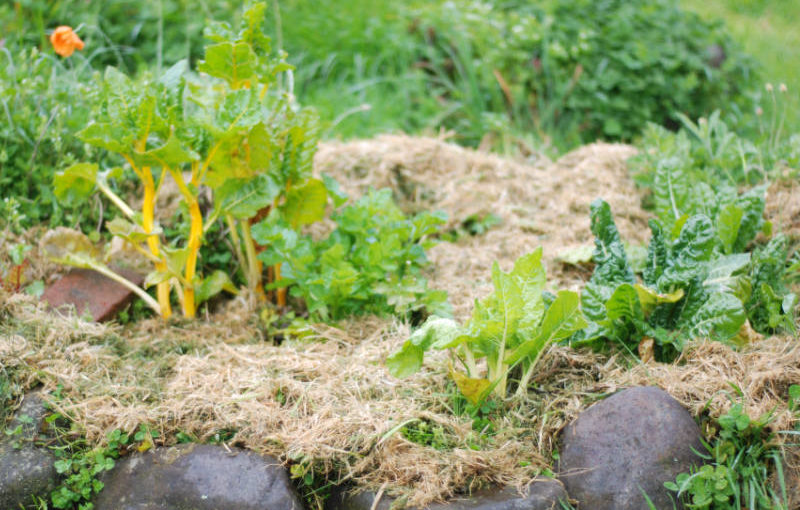I gotta be honest.
This isn’t step three. It’s supposed to be done at the same time as step one.
But you need to have your sh!t together to do that.
My wife and I have young kids, businesses and interests other than gardening.
I do this in separate steps because some weekends I just rather go to the beach with the fam and hit that Taranaki surf.
I suspect if you are reading this that you, like me, don’t have time to spend all weekend every weekend in the garden either.
That’s cool. This method works just fine too.
Inspired laziness
My teacher and permaculture pioneer Geoff Lawton often asked, “What would you rather do, 99 hours of work and 1 hour thinking or 99 hours of thinking and 1 hour of meaningful work?”
Some people call it experience or efficiency. I call it inspired laziness. But it gets you the same or better result for a fraction of the cost and effort.
Sound good?
Let’s apply that to growing your own food…
Why should you mulch your garden?
Ask yourself, “where do I see bare soil in undisturbed nature?”.
If you are thinking “nowhere”, you are correct.
Bare soil is unnatural and nature is going to work hard to turn it back into its highest evolutionary form – an old growth forest.
First with weeds, then with grasses and brambles, then shurbs, small trees, big trees, then bigger trees, then eventually kauri and macrocarpa.
It’s an amazing process, but it’s not going to help you grow food.
Go ahead and start fighting Mother Nature. I dare you!
Let’s see who is stronger and more determined… 🙂
That brings us to mulch.
What is mulch?
The purpose of mulch is to prevent your garden turning into a national park.
Mulch will block sunlight from scorching your soil, retain moisture and prevent weeds and grasses from moving in. It’ll do it’s job for a time, then turn into soil..
Take another look at the photo above from my garden. Notice how grasses and weeds are creeping in between those rocks, but there aren’t any weeds inside the actual garden bed.
If you don’t use mulch, you’ll have to watch the garden like a hawk and pull every weed employed by nature. Or poison your food with chemical sprays.
I recommend mulch. Lots of it.
What materials can I use to mulch?
Cardboard, straw, hay and grass clippings are best to use on your garden. But avoid woodchips.
The short version of a rather long and scientific answer as to why you shouldn’t use woodchips is that it has to do with soil bacteria. Decomposing wood turns into soil ideal for growing trees. Grassy mulch decomposes into soil ideal for growing vegetables.
That also means forget that commercial compost found in garden centres. It’s mostly made from woody material. Grow your own soil and save your money to buy seeds and plants.
Old wool carpets are great too.
How do I mulch my garden?
You’ve already started by cardboard mulching your garden and de-compacting the soil.
Now pile on hay, grass clippings, newspaper, straw… whatever you can get your hands on. This goes on top of the cardboard. If you don’t have cardboard, you’ll need double the amount of loose mulch.
Using too little mulch doesn’t help as weeds will start poking through soon.
I use mostly grass clippings because that’s the easiest and cheapest for me.
On Bill Mollison’s farm, my wife and I used old hay. Just before the start of hay season, farmers need to clear out their barns. We put an ad in the local paper and got dozens of massive round bales basically for free. We laid it down knee high.

Don’t worry, “pillow thick” will be good enough for your home garden.
Mulch will decompose and you’ll have to top it up from time to time.
In summary
By mulching, you’ll be building soil. Your soil will be protected and will retain moisture. It will be teeming with beneficial soil microbiology that your veggies will love.
Mulch holds back weeds and frees up your time.
It will save you money.
Petty cool, eh?
Pat yourself on the back knowing that awesome force called Mother Nature is doing 99% of your work for you! 🙂
Coming up next…
- How to compost at home.
- How to choose what to plant.
- How to plant out your garden.

